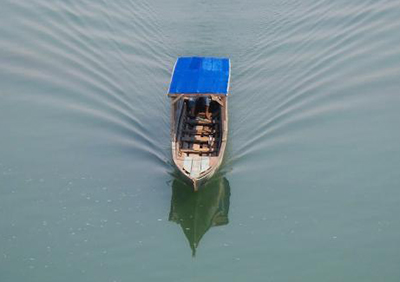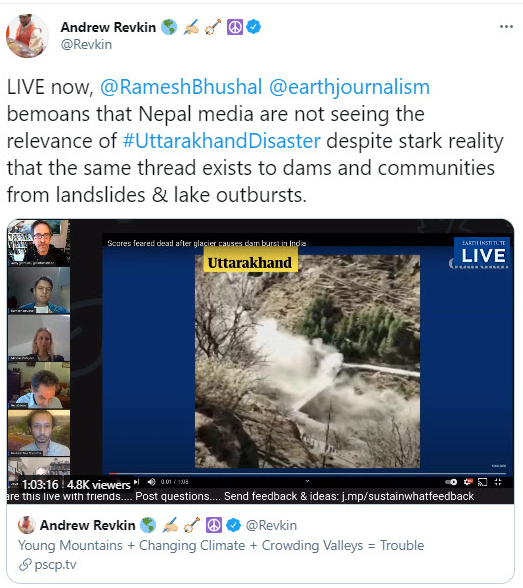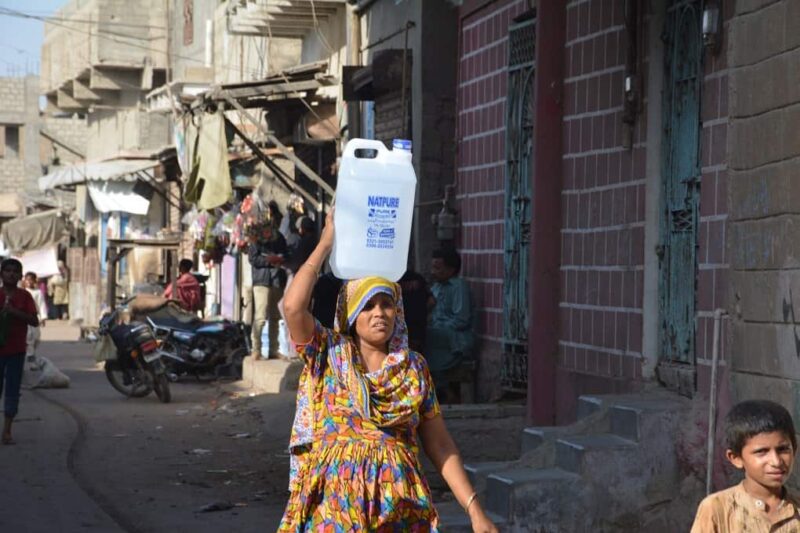“The river in our village has dried. My family has lost its crops and most of the goats. My cousin’s marriage was cancelled because her fathers’ goats died too. But nobody in our village knows ‘climate change.’ Everyone thinks it’s our bad luck.” – Sibongile, a radio journalist from Malawi in conversation with EJN’s Stella Paul
February was a short month, but there was no shortage of activities for us at EJN. We’ve recently launched several new opportunities, including a data journalism Fellowship, a new round of funding for stories on renewable energy in India and a brand new project to support environmental reporting by Indigenous journalists globally. Meet one of our mentors for that program below. You’ll also hear about one reporter we’ve worked with in Pakistan who has helped raise awareness about the difficulties facing people living in Karachi’s slums during heatwaves and a media partner supporting stories about how climate change is affecting the small, Buddhist kingdom of Bhutan. We have a recap on our recent webinars – think biodiversity – and a nod to the award-winning work of some of our recent East Africa cohort. Read on for more, and as always, share your thoughts with us.
From a Climate Refugee to a Storyteller

When one of our sister projects at Internews, the Listening Post Collective, came to us recently and asked if we had any updates they could highlight in their newsletter, we said, “Yes, many!” They’d been talking with an Indigenous woman based in Anchorage, Alaska, who runs a podcast called Coffee and Quaq, and we thought what better voice to include than that of Hyderabad-based Stella Paul, a member of the Bishnupriya ethnic minority group in India and one of EJN’s newest team members.
So Paul wrote about her path to covering climate issues from her childhood home in Manu valley to today, as she the joins the EJN team to manage environment and health projects and mentor Indigenous journalists.
“Now, I can support these storytellers by training them and giving them the resources that they need to reach the unheard people who live the environmental challenges I once did. I can also guide and mentor them to not only ask questions but also help share with the world the solutions that the communities believe would work for them,” she wrote.
Read Stella’s entire essay and check out our Indigenous Environmental Journalism Story Grants.
Impact: Coverage of Heatwaves in Pakistani Slums Garners Attention, Sparks Policy Changes among Local Officials
In 2018, reporter Amar Guriro covered the impact of heatwaves on slum dwellers in Karachi, Pakistan. His story followed a severe 2015 heatwave in Karachi that killed an estimated 2,000 people, with temperatures as high as 49-degrees Celsius. Guriro wanted to explore in-depth how the heatwave continued to affect informally settled communities even years later and determine what was needed to prevent a re-occurrence. Using support and funding from EJN, he produced “A Portrait of a Karachi Slum During a Heatwave,” in May 2018, bringing the lives of slum dwellers into the foreground. Since then, the provincial government has started to formally recognize the legal status of Karachi’s slum areas and Guriro has continued to cover the impact climate change has on marginalized communities in urban areas and beyond. Read more
New Fellowship Offers Intensive Data Journalism Training to Mekong River Reporters
 The lower Mekong River Basin is facing a multitude of challenges, from climate change to rapid development to the construction of hydropower dams that have changed the river’s flow over the past decade. We’ve launched the Mekong Data Journalism Fellowship to provide reporters in the region with the tools they’ll need to report effectively on the threats and potential solutions facing this vital waterway. Through a partnership with the East-West Center and the Stimson Center, we’re offering an 80-hour data journalism training, personal mentorship for data-driven reporting and virtual seminars with regional experts on river management and water issues. Read more about the Fellowship and apply before our March 7 deadline.
The lower Mekong River Basin is facing a multitude of challenges, from climate change to rapid development to the construction of hydropower dams that have changed the river’s flow over the past decade. We’ve launched the Mekong Data Journalism Fellowship to provide reporters in the region with the tools they’ll need to report effectively on the threats and potential solutions facing this vital waterway. Through a partnership with the East-West Center and the Stimson Center, we’re offering an 80-hour data journalism training, personal mentorship for data-driven reporting and virtual seminars with regional experts on river management and water issues. Read more about the Fellowship and apply before our March 7 deadline.
Climate Change Stories from Bhutan Call Attention to Policymaking
The Bhutan Media Foundation, one of 14 media grantees from year three of EJN’s Asia-Pacific project, has been providing grants and support for a series of stories looking at how climate change is impacting this small Buddhist kingdom on the eastern edge of the Himalayas. The in-depth reports look at everything from how traditional farming and herding practices have been altered by climate change to the dangers of glacial collapse and flash flooding and will be used to convene conversations with policymakers about the issues they raise. Read more
Webinars
In case you missed them, we had a trifecta of great webinars on ocean and biodiversity issues in February. Here’s a wrap up with links to the recordings and resources:
- The emerging role of AI in fighting ocean crime: A journalist’s guide to how AI and algorithms are changing the way illegal activity is detected in the oceans with tips on open-source information available to use in reporting on ocean issues.
- Planetary priorities for the Biden administration: A look at how US President Joe Biden and his administration are shaping their environmental agenda and what it means for biodiversity on a global scale.
- Beating the biopirates? A journalist’s guide to biodiversity access and benefit-sharing.

A few EJNers also led a discussion on the threat of climate change on mountain communities following a dam collapse in India:

Opportunities
Story Grants
- Indigenous Environmental Journalism (Deadline: 12 March): Grants to Indigenous journalists will support the production of in-depth stories that call attention to climate justice, biodiversity, sustainable ecosystems and other issues related to the rights and well-being of Indigenous peoples and communities. Learn more and apply here.
- Renewable Energy Reporting in India (Deadline: 15 March): Grants will support the production of in-depth stories on the prospects, problems and pathways forward to renewable energy. Although we have a particular focus on Maharashtra, Karnataka and Tamil Nadu, applications will be welcome from journalists all over India, about renewable energy in all states and union territories. Learn more and apply here.
Fellowships
- Mekong Data Journalism Fellowship (Deadline: 7 March): Open to journalists from Mekong Basin countries that aim to strengthen their data-journalism skills and support data-driven investigations into water security challenges and solutions in the Mekong region.
Awards
Daniel Wagema Mwangi and Janet Murikira were among 25 journalists recognized in the 2020 African Climate Change and Environment Reporting Awards (ACCER) for stories they produced following EJN’s East Africa Wildlife and Conservation workshop in Mombasa. Mwangi was first runner-up in the print category for this story on how fishermen in Kenya are reaping benefits from marine conservation and Murikira won the digital category for this story on how bees are being used to guard a mangrove forest. The ACCER Awards are sponsored by the Pan African Climate Justice Alliance.
Faiz Musa Abdallah, who also participated in the Mombasa workshop, was recently awarded 3rd place for environmental reporting from the National Environment Trust Fund (NETFUND) in Kenya.
What we’re watching, reading, listening to…
- Reading: Our #EJNReads honored Black History Month in February by highlighting stories like this one on the origins of environmental justice campaigns and this one on how generations of air pollution in Black communities worsened COVID-19 death rates in the Gulf Coast.
- Watching: Our Mother’s Land: A documentary about how women in Indonesia have spearheaded the fight against corporations seeking control of their natural resources. Journalist Febriana Firdaus travels to meet several of the women leaders who have led this resistance in the face of violence, imprisonment and the judgement of conservatives in society to see what their lives are like now. From the Gecko Project and Mongabay.
- Listening to: Archival records are helping researchers in some places figure out how fast sea levels are rising. But that’s harder for a lot of countries and regions. In Cameroon, a researcher is digging into colonial records. This podcast offers some interesting food for thought on data and breaks down why sea levels are rising in the first place. Listen to the podcasts
